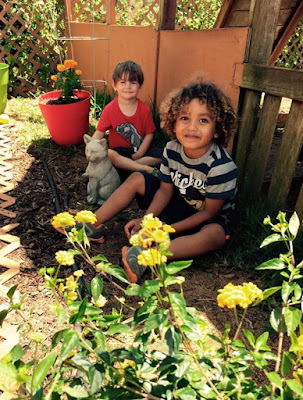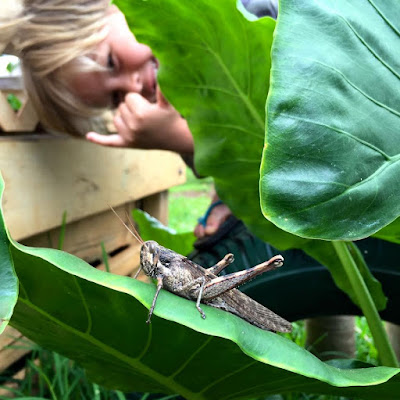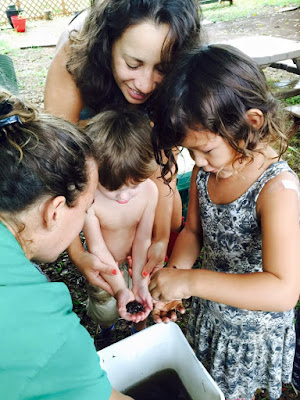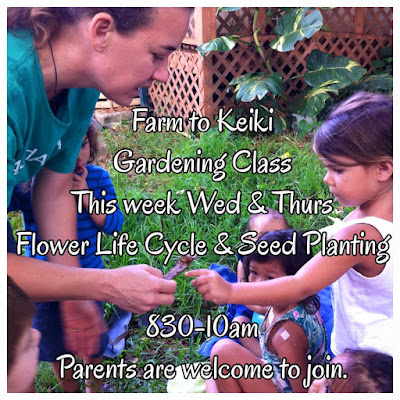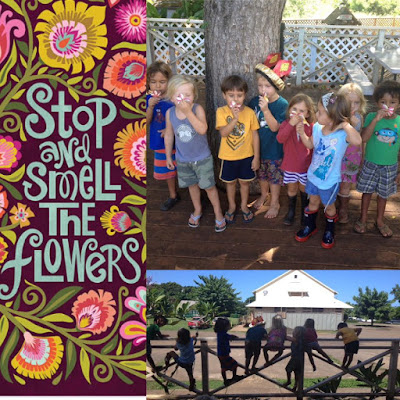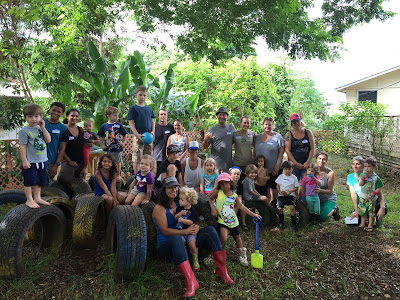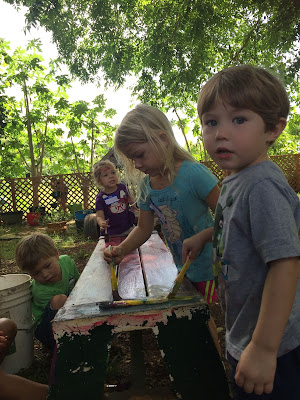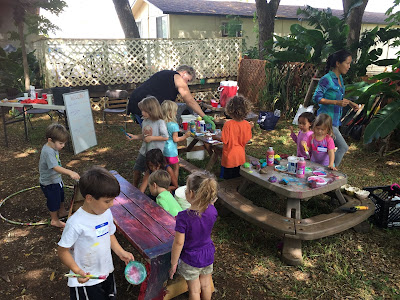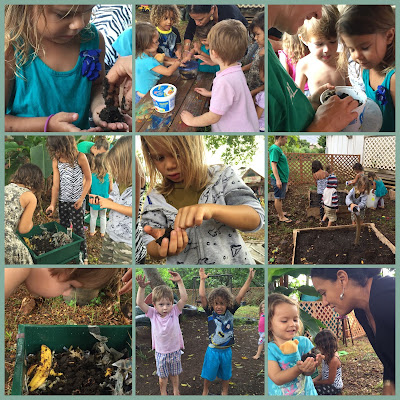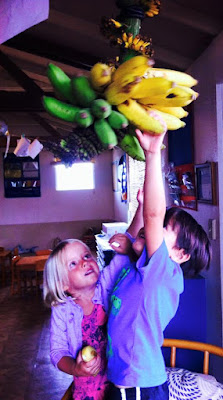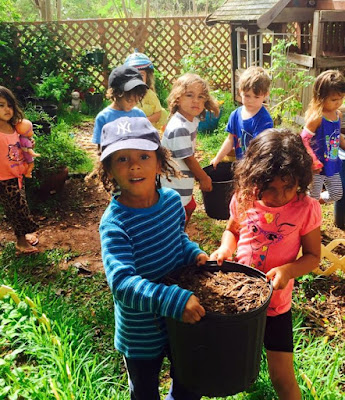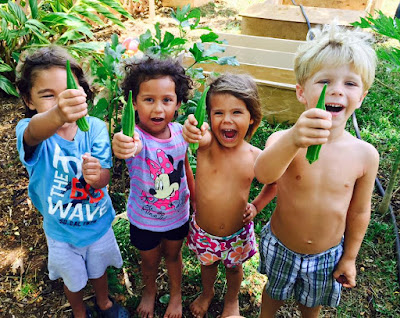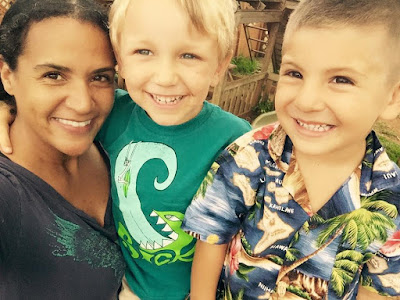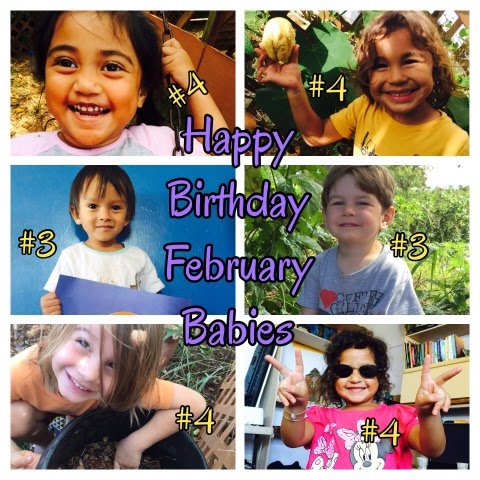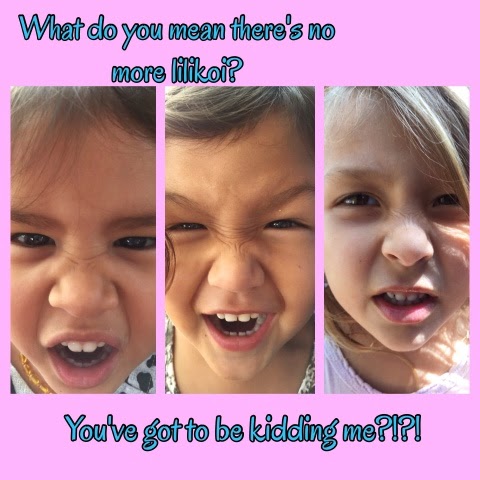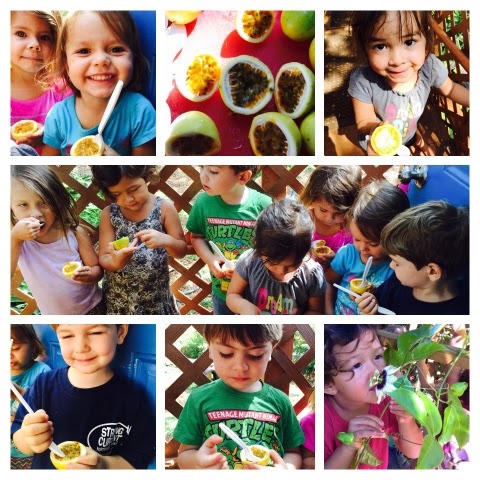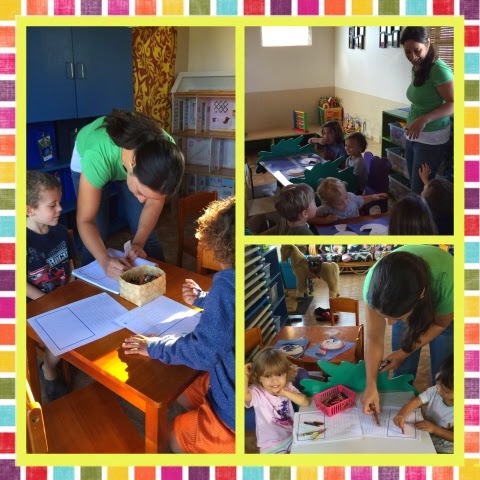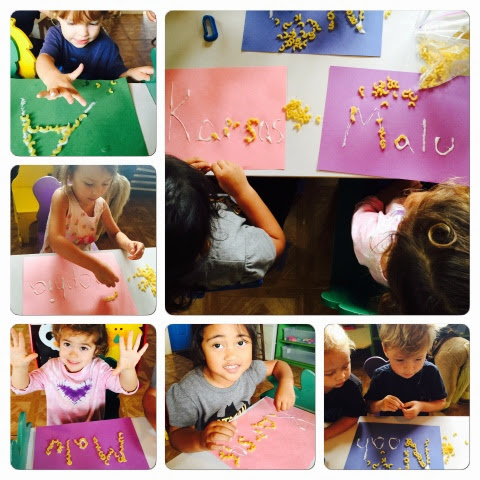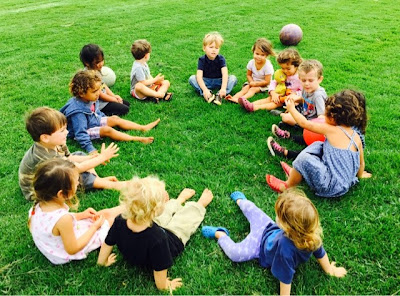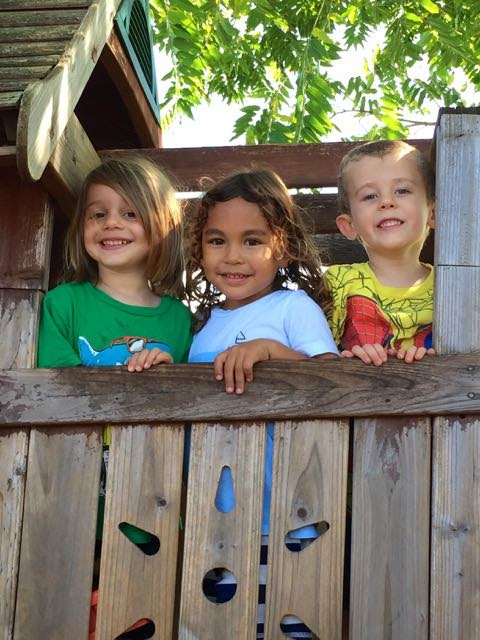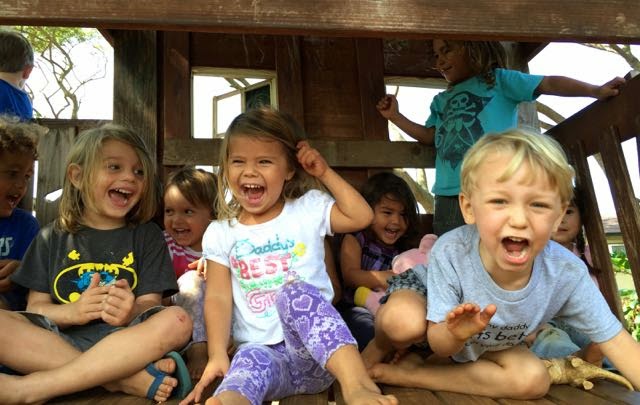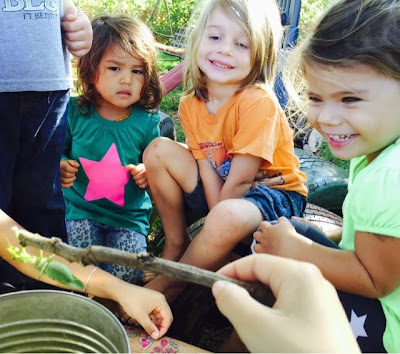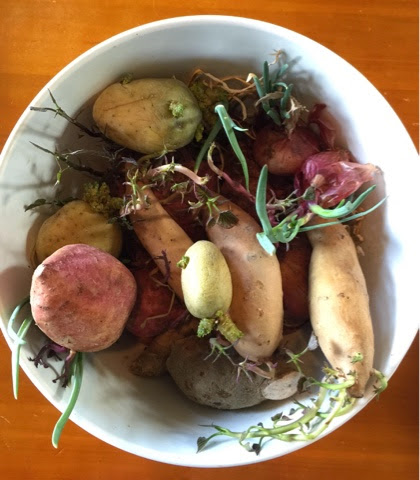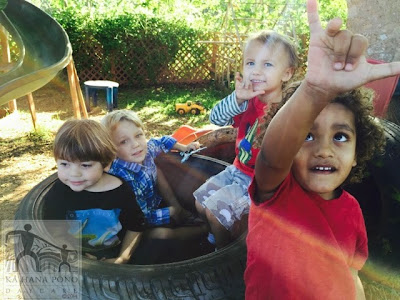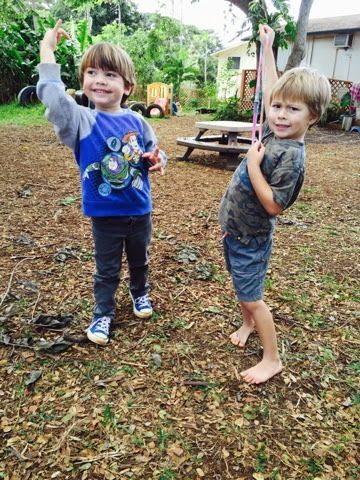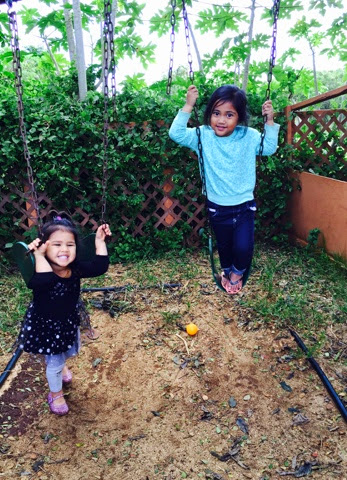We believe teaching & living with Aloha & in Pono encourages the best from caregivers, teachers, children, families and community members.
Co-Creating Garden Spaces
"Gardening is a labour full of tranquility and satisfaction; natural and instructive, and as such contributes to the most serious contemplation, experience, health and longevity" - John Evelyn
November 2015 Openings
We have 2 full time openings available in our 2-3 year olds cottage (opening in November)
We have 2 part time openings available in our 3-5 year olds cottage.
Farm to Keiki with Aunty Lydi
Lydi Morgan Bernal will carry Ka Hana Pono's garden program forward with weekly garden lessons for the children and regular opportunities for family involvement through Garden Party Workdays and workshops.
Garden lessons will focus on inspiring children to become reverent observers, caretakers, and co-creators with Nature. They will practice Garden Agreement and other protocols to help them be safe, kind, and respectful with plants, animals, people, and all beings!
Lessons will introduce students to basic botany including the fundamental concepts of life cycles and plant parts, and important gardening concepts such as composting and soil health, nature's elements, garden creatures, moon phases, peace gardens, and the importance of trees. Children will plant and care for vegetables, fruits, herbs, medicinal plants, and traditional Hawaiian crops, and they will experience and celebrate the joy and bounty of our harvests!
Lydi was raised in Honolulu and graduated from Punahou School and Amherst College with a degree in Biology. Prior to her current role as Coordinator of the statewide Hawai‘i Farm to School and School Garden Hui, Lydi worked with the Kokua Hawai‘i Foundation (2006-2014) as a Garden Educator, then School Garden Coordinator where she collaborated on the creation of the ‘AINA In Schools K-6 garden and compost curriculum, trained volunteers, and worked with public and charter elementary schools on O‘ahu to create and sustain school gardens and farm to school programs. She is a certified O‘ahu Master Gardener and Permaculture Designer, a graduate of Hawai‘i’s Agricultural Leadership Program, and a member of the Hawai‘i School Peace Gardens committee. Lydi and her husband Raul own and operate The Garden Oven brick oven pizza business on the North Shore and their daughter Malu is a happy member of the Ka Hana Pono 'ohana!!!
Garden Work Day
Mahalo to everyone who came out to lend some hands to renew and refresh our garden and playground area. Aunty Lydi from our Farm to Keiki Program did an awesome job coordinating the work that needed to be done and it was awesome for all of us to be a part of the transformation! :)
Farm to Keiki Program
The children got to participate in making a worm composting station - mahalo Aunty Lydi for sharing your aloha aina with Ka Hana Pono's keiki!
Music may achieve the highest of all missions...
Yes we do have a drum set that makes its way to the playground every now and then...why not? smile emoticon XOXOXO
"Music may achieve the highest of all mission: she may be a bond between nations, races, and states, who are strangers in many ways; she may unite what is disunited and bring peace to what is hostile." ~ Dr. Max Bendiner
HOW BANANAS GROW AND WHAT BANANA PLANTS ARE LIKE
Bananas don’t actually grow on trees—they grow on plants that are officially classified as an herb (not surprisingly, the world’s largest herb). They’re in the same family as lilies, orchids, and palms.
Banana plants grow up to 25 feet high, and their leaves can grow to be 9 feet long and 2 feet wide. Their roots can be hundreds of years old.
Bananas are technically berries.
Banana plants grow not from seeds but from bulbs.
A cluster of bananas is called a hand, and a single banana is called a finger. Each banana hand has about 10 to 20 fingers.
About 75 percent of the weight of a banana is water.
A few varieties of wild bananas include bubblegum pink bananas with fuzzy skins, green-and-white striped bananas with pulp the color of orange sherbet, and bananas that taste like strawberries when they’re cooked.
It's A Magical World...
"The world is full of magical things patiently waiting for our wits to grow sharper" ~Bertrand Russell
2015 - 2016 CURRICULUM
Here's the curriculum for the coming school term! It's going to be a great fun year!!
Busy Bees In The Garden Today
- Planted a taro (kalo) patch - dug a hole - buried the roots - grabbed nutrient rich mulch from our mulch pile - noticed our soil had plenty of worms - put a layer of mulch on top - then bordered it with logs - watered the pile thoroughly - and we did this all together with team work! :)
Why Empathy Is So Important:
Television shows / cartoons and video games that involve violence give children practice ignoring empathetic feelings. Too much of that kind of practice and children can have a difficult time developing empathy.
Empathy is the ability to understand the world from another person’s point of view AND motivation to treat another kindly based on that understanding. Some have suggested that motivation to treat another kindly happens because an empathetic person actually feels another’s feelings. Empathy is necessary for caring behavior.
Empathy has an emotional and a thinking component. To have empathy means to feel another's feelings (pain, sorrow, joy and other emotions). To have empathy one must also understand intellectually.
Empathy is the cornerstone of ability to love, and therefore empathy is at the core of good character.
*A form of good practice you can try at home:
Create concrete ways for children to demonstrate empathy such as a "helping basket" with tissues, Band-Aids, and other items children can use to help someone else feel better.
***Don’t expect empathy every time. Young children are still learning how emotions work, and how people get along with others. Encourage empathy, but don’t expect perfection.
**On the other hand, some parents wonder if their child is too empathic. There are children who can easily pick up the feelings and thoughts of others as they unconsciously reach into human and spirit energy fields to gather information and understand things around them. Seeing with their spiritual eyes, feeling with their spiritual senses, hearing with their spiritual ears - this can be draining, confusing and emotional for a child. As parents, teachers, and counselors, we need to teach children how to properly use this empathic gift. Empathic kids need someone they can talk to. They need information on how to keep their auras clear, to open and shut their intuitive abilities at will, and set energetic boundaries. **The Care & Feeding of Indigo Children by Doreen Virtue is a worthwhile read for all parents.
XOXOXOXO
Hot Tamale! :)
Hot Tamale! Hot Tamale! Why? Cause the kids thought that was much funnier than Hot Potato! Hot Potato! 😍
Teaching Acceptance
Looking around the room at each other, using books and photographs are visual prompts that help children comprehend that differences whatever they may be does not change who they are inside.
We are all humans. We discuss why some people are different physically and how some people’s differences may not be physical with our common ground being that we all have a heart and feelings. People can look different, people can sound different yet we are all people.
We will be chatting about thinking before we speak and counting in our heads up to five and taking a few moments to think about what we might want to say.
We will be chatting about what it might be like to be the other child or person. Empathy is the key to acceptance. Children who feel good and accept who they are themselves are more respectful towards others and are also less likely to bully.
We are all humans. We discuss why some people are different physically and how some people’s differences may not be physical with our common ground being that we all have a heart and feelings. People can look different, people can sound different yet we are all people.
We will be chatting about thinking before we speak and counting in our heads up to five and taking a few moments to think about what we might want to say.
We will be chatting about what it might be like to be the other child or person. Empathy is the key to acceptance. Children who feel good and accept who they are themselves are more respectful towards others and are also less likely to bully.
Learning the Language of Emotions:
Emotion regulation means being able to think constructively about how to cope with feelings. We want children to have their feelings, but not be overwhelmed by them -- to feel discouraged but not give up; to feel anxious but not stay home; and to be excited but not get so carried away in their enthusiasm that they use poor judgment in making decisions.
In my experience children most effectively learn to regulate their emotions when they are confident that their feelings will be heard.
Through thoughtful conversations with them about their feelings, children begin to learn that their bad feelings, although painful, will not last forever -- that through their own efforts or with the help of supportive adults, they can make things better.
As a child learns that his/her feelings will be heard, he/she will be less insistent in their demands, and more open and flexible in seeking solutions to problems. He/she will less often get stuck in attitudes of blaming, argument and denial. He/she will be more able to feel empathy and concern for others, and to take responsibility for his/her actions.
In my opinion this is the most important lesson we can teach, the lesson that is most essential to children's present and future emotional health. XOXOXOXO
Gardening helps children become caring individuals
Gardening fosters responsibility in young children by encouraging them to use their hands to prepare the soil, apply fertilizer, sow seeds, remove competing weeds, add water and harvest the crop. These practices are necessary for a plant to grow to its full potential and produce food.
When children accept these responsibilities, we help them to become caring individuals. And when children experience the loss of plants because of neglect, they learn the tragedies of improperly caring for the plants. Through these real-life lessons in gardening, children develop an appreciation for the value of responsibility.
Scientific discovery abounds in gardens. Animals, insects, worms and other creatures are attracted to plants growing in a garden. Children learn by observing the ecosystem in a garden- bees pollinating plants; worms living in the soil and breaking down organic matter, - working in the soil to make it more fertile and plant reproduction.
***I should add that the children showed such aloha for those baby chicks who were happily feeding in our potato patch...not one child shoo'd them away or shouted at them...instead the kids laughed and shared in the joy and pride of having creating a place so special that baby chicks felt comfortable to come and eat. #LIVEALOHA #LIVEPONO #KAHANAPONO
When children accept these responsibilities, we help them to become caring individuals. And when children experience the loss of plants because of neglect, they learn the tragedies of improperly caring for the plants. Through these real-life lessons in gardening, children develop an appreciation for the value of responsibility.
Scientific discovery abounds in gardens. Animals, insects, worms and other creatures are attracted to plants growing in a garden. Children learn by observing the ecosystem in a garden- bees pollinating plants; worms living in the soil and breaking down organic matter, - working in the soil to make it more fertile and plant reproduction.
***I should add that the children showed such aloha for those baby chicks who were happily feeding in our potato patch...not one child shoo'd them away or shouted at them...instead the kids laughed and shared in the joy and pride of having creating a place so special that baby chicks felt comfortable to come and eat. #LIVEALOHA #LIVEPONO #KAHANAPONO
Continuing Education
I'm so grateful that PATCH Hawaii offers online continuing education courses for early childhood educators in addition to those that need to be taken in person.
Today we were able to participate in:
1) The Importance of Play: characteristics & importance of play and identifying common problems children may have in play.
and
Happy Aloha Wednesday!! 🌺🌈
Check out our website to hear a fun song that Uncle Bison is teaching the kids!
1, 2, 3 All The Animals In The Sea...
Subscribe to:
Posts (Atom)

